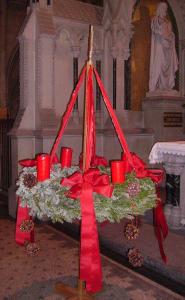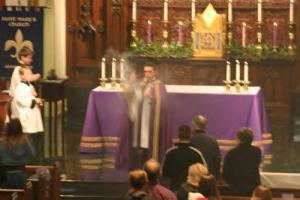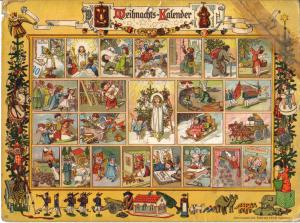 I know full well that very few of you will use Jeremiah on the first Sunday of Advent, though I received a Facebook message just this morning that a long-time preacher friend of mine plans to do so from a pulpit in Spain. So I know that at least for her Jeremiah still speaks even at this uniquely Christian time of the year. Why that may be the case is the subject of this essay.
I know full well that very few of you will use Jeremiah on the first Sunday of Advent, though I received a Facebook message just this morning that a long-time preacher friend of mine plans to do so from a pulpit in Spain. So I know that at least for her Jeremiah still speaks even at this uniquely Christian time of the year. Why that may be the case is the subject of this essay.
First, a few scholarly observations about Jer.33:14-16. Many commentators assume that this passage is a very late one in the collection we call Jeremiah, perhaps being written well after the exile of Israel to Babylon that lasted until 539BCE. If that is so, this tiny section has been added to what is known as Jeremiah’s Book of Comfort that originally included chapters 31-32. These chapters may have been composed at the very end of the reign of the last king of Israel, the Babylonian choice for king, Zedekiah. Though he was first a kind of puppet of the powerful Babylonians, he was induced by some in his court to rebel against his masters, and as a result Nebuchadnezzar returned to Jerusalem with a large army, surrounded the city, and forced their surrender in 587BCE. Zedekiah, the would-be rebel, was blinded just after witnessing the murder of his children, and was dragged off to Babylon. We are told that at this time, and not long before, Jeremiah was forced by his followers to leave the city and head toward Egypt. Apparently, he died there, though there is no real proof of that.
The book of Comfort, of course, includes the famous New Covenant passage (31:31-34) where Jeremiah announces that YHWH will make a new covenant with the people, not like the old one of Moses that they shattered. This one, says Jeremiah, will be written on the very heart of the chosen ones, the result of which will be that everyone shall finally know YHWH, from the least to the greatest. Then, YHWH will utterly forgive their sins and make them at last the faithful people of God. One should not over- romanticize this passage and tie it directly to the life of Jesus as the one who in fact comes to bring that very covenant. The fact that Jeremiah believes that no one will ever know YHWH merely by teaching Torah to one another—the only tool any one of us has—but will have to undergo divine heart surgery to understand what faith means, indicates that Jeremiah has a rather gloomy notion of humanity. Left to our own puny efforts at evangelization through word and deed, we are doomed to fail utterly. Only a direct intervention of YHWH will bring the desired goal of followers who both understand and follow the Torah. Thus, the Book of Comfort is no smiley, sweet document of easy consolation, but a warning of the certainty of exile before the intervention of God for the people’s good future.
And that is what we find in our text for today. The promise of 33:14-16 of a “righteous branch to spring up for David,” that is the promise of a perpetual ruler on Israel’s throne who has sprung from David’s loins (33:17-26), is tempered by the harsh prediction of the destruction of Jerusalem and the captivity of Zedekiah at 34:1-5. In other words, the golden future of the righteous branch of David will only follow the horrors of fire and sword directed at the obvious Davidic branch, Zedekiah. If the scholars are right, all of this prose of doom and hope has been written after all of these very experiences have in fact occurred; Jerusalem has fallen, Zedekiah has been exiled, and Israel has been decimated once again by a vastly superior power. Yet, in the Book of Comfort, after all of that, there remains a measure of hope for a scattered Israel. They will be enabled to sing YHWH’s song in foreign lands, despite the fears of the poet of Ps.137.
Why are such hopes so important now? Our world, as the world of Israel, is riven with division and terror and hatred and destruction and famine and death. We need hope so desperately as to weep for it. I write after still another mass shooting by a disturbed white male wielding an automatic weapon designed only to kill quickly and efficiently. It did so, as 12 innocent lives were cut short. “The days are surely coming, says YHWH, when I will fulfill the promise I made to the house of Israel and the house of Judah.” And exactly what is that promise? “I will cause a righteous branch to spring up for David, and he shall execute justice and righteousness in the land” (Jer. 33:15). This has long been YHWH’s promise to the people, that some day, finally, at last, justice and righteousness will be the central concerns of a ruler who is sure to come. For the early Christians, of course, that ruler was Jesus of Nazareth who in his life and in his death, appeared to have justice and righteousness as his main goal. Since he has come, they believed, he has called all who would follow to make justice and righteousness the vary hallmark of their lives. It is that, they said, and we claim, that makes a Christian.
But we are far from that ideal, are we not? Rather than justice, we shout “nationalism,” “America is great,” “Stop them at our borders!” This is not justice; this is bigotry, self-serving arrogance, self-absorbed self-protection. Rather than righteousness, we shout, “Leave us alone,” “Go back to where you came from,” “Speak English—this is America!” If Jesus is really the righteous branch that we celebrate at Advent, then we are not his followers, no matter how loudly we claim to be. Jeremiah is a witness to the ongoing hope and promise of God; God simply never stops offering hope to us, even when we laugh right in its face. There is no exile too distant, or too far from God’s demands, that can abrogate the inexhaustible and unchanging promises of God. That is in the end what we hope at Advent, that God has not given us up to our own dreadful and deathly devices. That, I think, is what makes Jeremiah and his surprisingly hope-filled word still worth reading some 2600 years after his mysterious death.
(Images from Wikimedia Commons)











